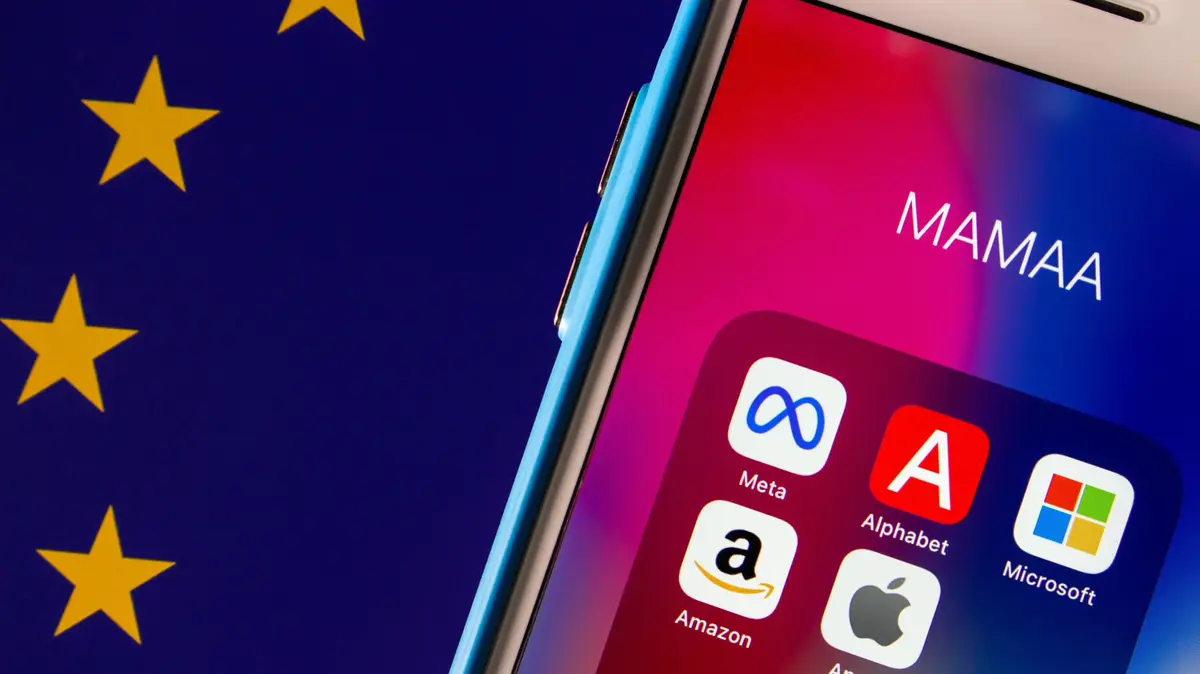Less power for Google and Co: EU agrees on digital law
Created: 03/25/2022, 04:36
The EU has passed the digital law - with far-reaching consequences for tech companies.
© Fabian Sommer/dpa
Tech heavyweights dominate the web - competition often has a hard time.
The EU has now passed a law intended to make competition fairer.
Consumers should also benefit from this.
Brussels - When the EU last gave itself comprehensive rules for the Internet, the world was different.
Google had just been founded, Amazon mainly sold books, Facebook only came into being years later.
Problems like hate speech didn't exist online, and the cross-border power of some tech giants wasn't foreseeable.
Today, a good 20 years later, things are sometimes turbulent and often unfair on the Internet.
The EU wants to change that - and late Thursday evening took a big step in this direction.
Negotiators from the EU institutions agreed on the Digital Markets Act (DMA).
That is what the legislative package is about
The laws and rules in Europe are no longer up to the realities of the digital world - that was the impression under which the EU Commission proposed a large digital package in December 2020.
In addition to the Digital Markets Act, this also includes the Digital Services Act (DSA).
The DSA addresses social issues such as dealing with illegal content on the Internet and is still being negotiated between the EU institutions.
The DMA is intended to limit the market power of digital giants such as Google, Facebook and Amazon.
Because tech giants like Meta (Facebook) or Alphabet (Google) are often in a position to expand their power and slow down the competition.
The competition law from the analogue world, with its many years of proceedings, only helps to a limited extent.
The DMA now targets certain companies that are an important gateway to the end consumer for commercial users.
In the future, these “gatekeepers” will have to observe certain prohibitions and regulations.
These DMA rules will apply going forward
This includes that they are no longer allowed to treat their own products and offers preferentially over those of the competition.
Users should be able to delete pre-installed apps on devices more often and change default settings more easily.
And in the future, large companies will only be able to merge data from different sources with the express user consent.
If this consent is not given, users must be able to continue using the programs.
"This creates real alternatives between "paying with all data" or not being able to use any services," said CDU MEP Andreas Schwab (CDU), who negotiated the DMA for Parliament.
Although there is no blanket ban on personalized advertising or a complete ban on personalized advertising for children and young people in the DMA, reference is made to the DSA, in which this is planned.
What is also new is that messengers such as WhatsApp and iMessenger will in future be obliged to open up for communication with smaller services.
However, this does not automatically mean that Signal or Threema users can send messages or photos to friends on WhatsApp.
Because the smaller companies are free to decide whether they want to open up.
However, new providers could well come onto the market who link their service with Whatsapp.
This feature will not be available immediately for group chats.
In order to ensure appropriate safety standards, this is planned for the coming years, Schwab said.
There will be no obligation for social networks to be interoperable as requested by Parliament.
It should hit these companies
According to Schwab, around 10 to 15 tech companies should initially fall under the DMA - including the US giants Google, Apple, Facebook and Amazon.
Specifically, Thursday evening's compromise provides that digital companies are affected that either have annual sales of at least 7.5 billion euros or a market capitalization of at least 75 billion euros.
In addition, they would have to operate at least one so-called central platform service with at least 45 million active users and 10,000 active commercial users per month.
Central platform services should include: search engines such as Google, intermediary services such as Amazon Marketplace, social media such as Facebook, video platforms such as YouTube, messenger services such as WhatsApp or Facebook Messenger, operating systems such as the iOS of Apple's iPhones and Android and cloud services such as AmazonAWS.
During the negotiations on Thursday, Parliament and the EU states also agreed that web browsers and language assistants such as Amazon's Alexa are also included.
The DMA rules only apply to the respective platform service - not to the whole company.
These penalties threaten the tech giants
Violations are subject to severe sanctions, initially of up to 10 percent of global annual sales.
For repeated violations, it could be up to 20 percent.
In exceptional cases, in the case of "systematic violations", the EU Commission could, among other things, also prohibit mergers for a certain period of time or apply structural measures such as a break-up.
How to proceed now
The Council of the EU states and the European Parliament must confirm the agreement again, but this is considered a formality.
The DMA must then be published in the Official Journal of the EU and will come into force 20 days later.
That could be around early 2023.
A transitional period of six months then applies.
After the EU Commission has designated the gatekeepers, they have another six months to implement the DMA specifications.
Then it should already be 2024.
This is how affected companies react
Tech firms have lobbied heavily over DMA and DSA.
According to a survey by Lobby Control and Corporate Europe Observatory from 2021, the digital economy spends a good 97 million euros a year on lobbying in the EU institutions.
It is still ahead of the pharmaceutical, chemical and financial industries.
According to the survey, there were more than 270 meetings with the EU Commission on the DMA and DSA - 75 percent of them with industry lobbyists.
more on the subject
EU digital law is approaching: Less power for tech giants
EU agreement on digital law foreseeable
Digital Law: Tech giants must follow strict rules
The iPhone group Apple reacted to the agreement on Thursday with concern.
There is concern that some DMA regulations would create unnecessary privacy and security gaps for users.
"Other DMA regulations will make it impossible for us to collect fees for intellectual property in which we invest heavily."














